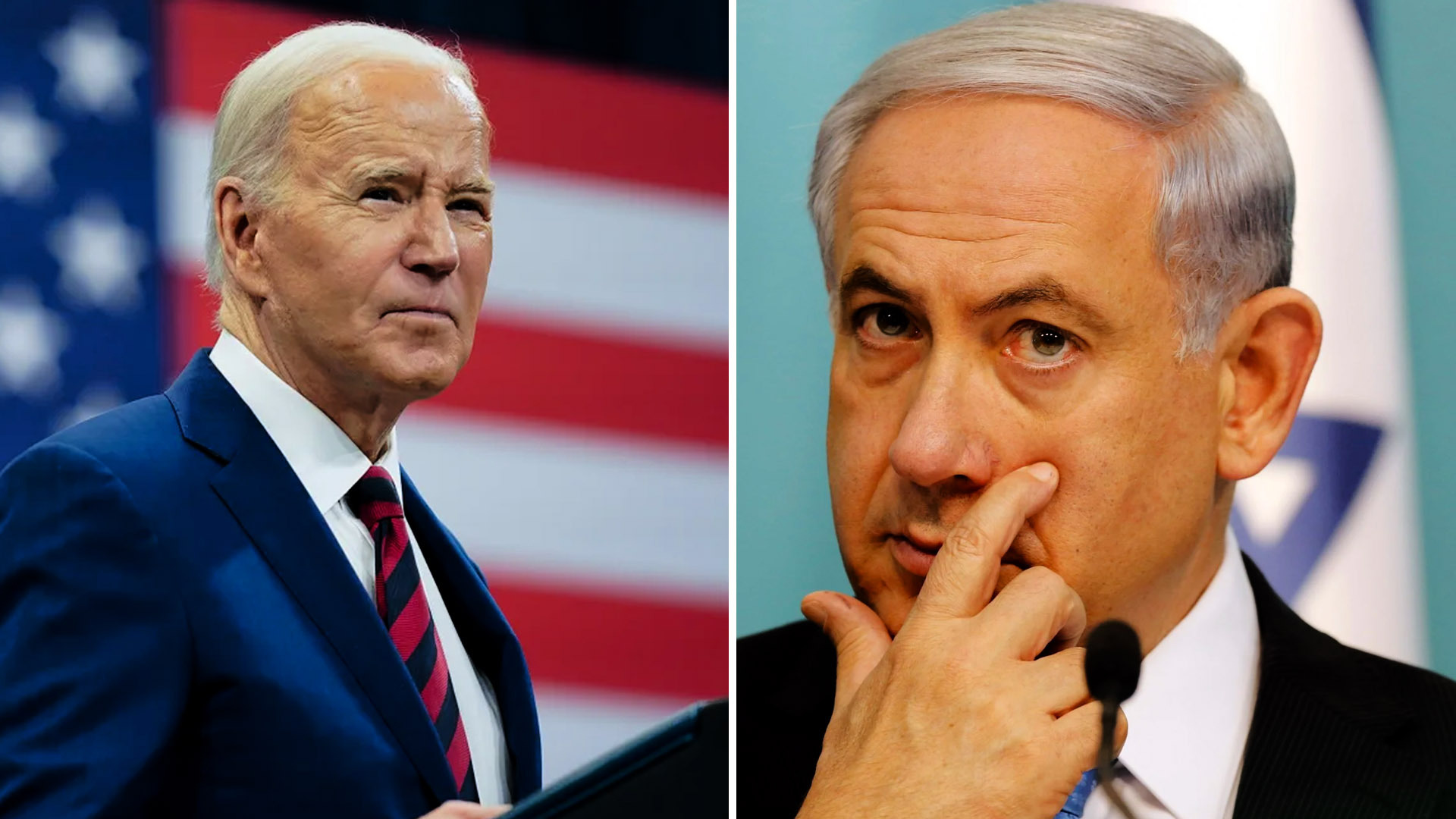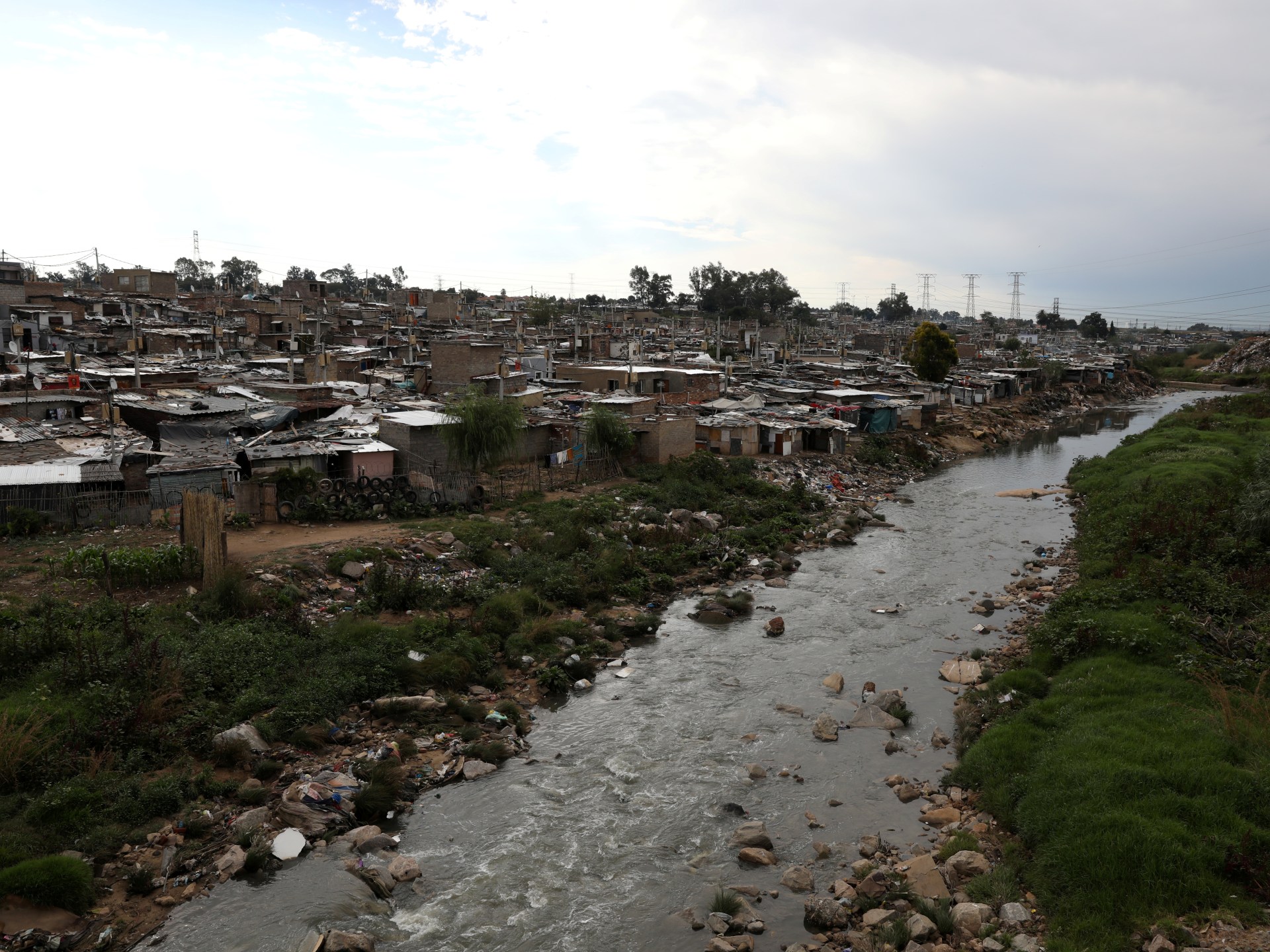Series of refugee crises hardens EU policy, then Ukraine happens
Athens, Greece – For the first time in almost 10 years, Greece does not find itself on the front lines of a European refugee crisis.
Greece’s migration ministry on Friday said it had discussed sending humanitarian and technical assistance to countries receiving Ukrainian refugees at a crisis meeting.
Greece is also concerned about the fate of 150,000 ethnically Greek Ukrainian citizens, mainly in Odesa and Mariupol.
Video footage on Thursday, day one of Russia’s full-scale invasion of Ukraine, showed columns of cars fleeing the Ukrainian capital, Kyiv, as civilians fled for Poland and Romania.
European Union migration commissioner Ylva Johansson had gone to Poland two days earlier to prepare for what she called a possible “massive inflow of refugees of Ukrainians into the European Union”.
The Ukrainian crisis comes just a few months after the EU defused a refugee crisis on its border with Belarus, and Greece nears the second anniversary of its own most recent refugee crisis.
On February 27, 2020, Turkey announced it was opening its borders to asylum-seekers crossing to Europe, sparking a crisis in its relations with the EU.
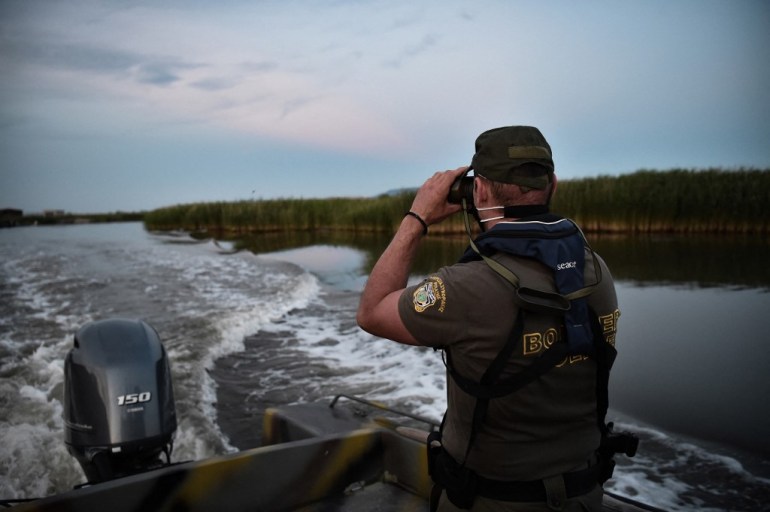 A Greek police officer patrols the delta of Evros River on a boat near Alexandroupoli along the Greek-Turkish border [File: Sakis Mitrolidis/AFP]
A Greek police officer patrols the delta of Evros River on a boat near Alexandroupoli along the Greek-Turkish border [File: Sakis Mitrolidis/AFP]The news fell like a bombshell in Greece and Bulgaria, which braced themselves for the influx. But over the next two weeks only the Greek border would be assailed, raising questions among Greek officials about what agenda the Turkish action might have entailed.
“What Turkey tried to do in March 2020 was to have a mass intrusion of more than 150,000 people in the north within a few days,” said a Greek government official who was present at high-level meetings at the time.
In fact, Turkey’s interior minister Suleyman Soylu said on February 28 that Turkey would release a million migrants into Europe.
“Europe cannot endure this, cannot handle this,” he told CNN Turk, “the governments in Europe will change, their economies will deteriorate, their stock markets will collapse.”
The sudden influx of even 150,000 “would obviously be beyond any capacity to sleep, feed, protect this population”, the Greek government official said on condition of anonymity.
“And that would have led to a collapse of the country in the north. If we … were a failed state, unable to provide for anything, and there were people breaking into houses to eat because there would be no food because there are no camps for 150,000 people … I don’t know what would be the military implication if that happened.”
“We were not certain what was the intention of [Turkish President Recep Tayyip] Erdogan at that point.”
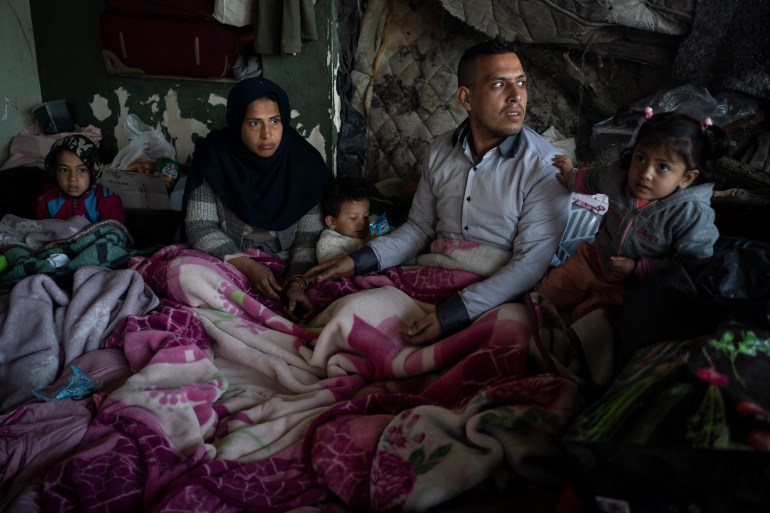 A family from Afghanistan gather at an abandoned building in Edirne near the Turkish-Greek border in March 2020 [File: Felipe Dana/AP]
A family from Afghanistan gather at an abandoned building in Edirne near the Turkish-Greek border in March 2020 [File: Felipe Dana/AP]Greece says it resisted more than 42,000 attempted entries at the land border over the next two weeks, and an unspecified number at sea.
The experience transformed Greek refugee policy to one focused on security rather than humanitarian needs and obligations. The crisis appeared to weaken Turkey’s already slender relationship with the EU while strengthening Greece’s.
‘European shield’
European Commission President Ursula von der Leyen, European Council President Charles Michel and European Parliament Speaker David Sassoli visited Greece’s land border with Turkey on March 3 in a symbolic gesture of support. Ursula von der Leyen called Greece “our European shield”.
Greece has since built 12km (7.4 miles) of steel palisade on its land border with Turkey, and plans to extend it to the entire length of the border.
European funds have poured into experimental border security projects ranging from drones, to mounted cameras and underground sensors.
At sea, refugees and aid groups have said Greece is conducting summary expulsions that deprive potential asylum-seekers of a chance to apply.
This would defy the Geneva Convention on the Status of Refugees by risking refoulment – the re-introduction of vulnerable people to environments where they could be harmed.
About 32 cases against Greece are now being considered by the European Court of Human Rights.
“Nothing has changed since,” in policymaking, says the official.
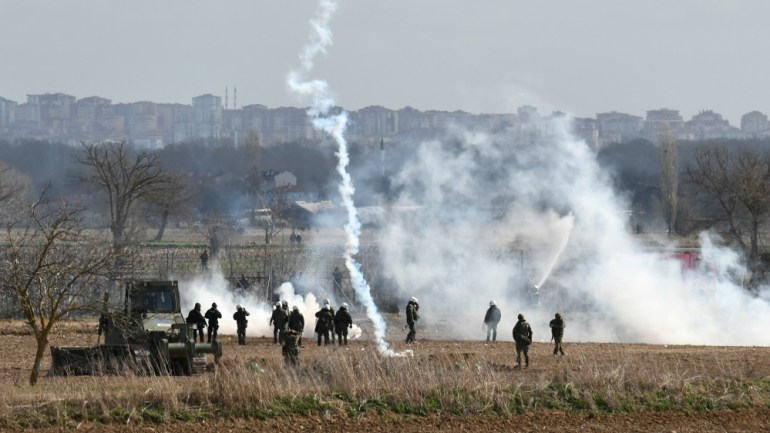 Greek riot police officers stand guard as tear gas is being fired near Turkey”s Pazarkule border crossing, in Kastanies, Greece on March 7, 2020 [Alexandros Avramidis/Reuters]
Greek riot police officers stand guard as tear gas is being fired near Turkey”s Pazarkule border crossing, in Kastanies, Greece on March 7, 2020 [Alexandros Avramidis/Reuters]Opposition leader Alexis Tsipras recently berated Prime Minister Kyriakos Mitsotakis in parliament for his security-bound policy.
“For you, geography and civilisation dictate that we should be Europe’s shield against responsibilities it won’t take up … for us they dictate the protection of human values, even if they’ve stopped being European values.”
Mitsotakis shot back: “Yes, we are Europe’s border guard. Greece has borders. They are protected. We defend them with full respect for fundamental human rights. We’re proud that [refugee] flows are down by 90 percent and we’ve clobbered the smuggling rings in the Aegean.”
Gradual hardening
While events in 2020 were a catalyst, both Greece and Turkey had been hardening their border policies for a while.
In July 2019, Turkey unilaterally suspended the re-admission clauses of the EU-Turkey Statement, saying that from its point of view this had always been meant as quid pro quo for visa-free travel for Turkish nationals in the EU.
A new Greek asylum law took effect on January 1, which aimed to process asylum claims within 28 days and increase the number of returns to Turkey.
It largely succeeded. Greece reported 38,000 pending asylum cases at the end of January, down from 126,000 two years earlier.
The Greek government was already taking a stronger security approach to borders, ordering four new 30-metre (98-foot) vessels and 15-18 smaller patrol vessels, and hiring 1,500 more people in the coast guard – effectively doubling its patrolling strength in the east Aegean.
“There is plenty of evidence that the Turkish government has weaponised migrants and refugees to exert pressure on Greece and the European Union,” says Dr Emmanuel Karagiannis, associate professor of international security at King’s College London.
“Greece has done nothing different than other governments have done regarding irregular migration: the US, the British, the Italian coast guards have equally tried to protect their borders.”
Turkey, too, has advertised that it is building a wall along its border with Iran.
 Migrants from the Middle East and elsewhere gather at the Belarus-Poland border near Grodno, Belarus on November 8, 2021 [File: Leonid Shcheglov/BelTA via AP]
Migrants from the Middle East and elsewhere gather at the Belarus-Poland border near Grodno, Belarus on November 8, 2021 [File: Leonid Shcheglov/BelTA via AP]Belarus copied Erdogan’s tactic of channelling refugees to put pressure on Europe last year, in his case for a lifting of sanctions against his government. The EU’s reaction showed how much attitudes have hardened.
“The instrumentalisation of migrants for political purposes by Belarus is unacceptable,” von der Leyen said on November 8.
She told European Parliament that traffickers were acting as “specialised travel agents offering all‑inclusive deals: visas, flights, hotels and, somewhat cynically, taxis and buses up to the border”, with the blessings of the Belarusian authorities.
Airlines carrying refugees to Belarus were threatened with the deprivation of overflight and landing rights within the EU.
‘Nobody wants anybody’
The Commission tripled border management funds to Latvia, Lithuania and Poland to 200 million euros ($223m) for 2021-22.
On December 1, it put forward a set of temporary asylum procedures on the three countries’ borders with Belarus, which allowed “simplified and quicker national procedures” to deport those whose asylum applications are rejected.
For more than a year, the Commission has tried to get member states to agree on a migration and asylum pact, without success.
The sticking point is that many countries do not want an automatic burden-sharing mechanism that forces them to take on a share of asylum cases from front-line states.
“[This] means we cannot have arrivals any more, but no one wants to say that. They are all hiding behind their fingers,” said the Greek government official. “Nobody wants anybody, but they all want sort of a more open approach. It doesn’t work.”


